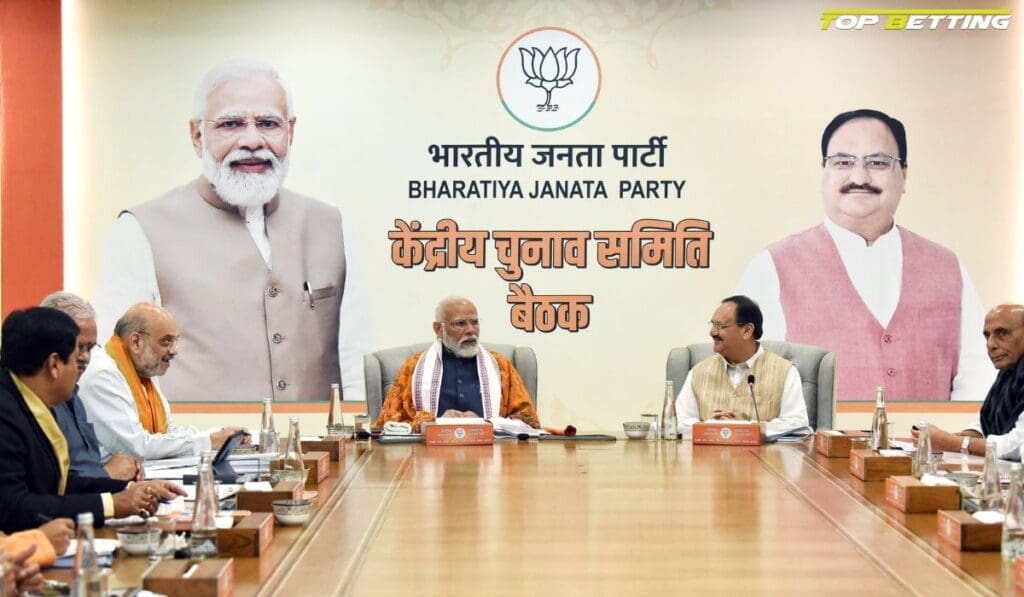
PM Modi leads a midnight meeting | For Lok Sabha Elections
Introduction
In a significant development ahead of the upcoming Lok Sabha elections, Prime Minister Narendra Modi took charge of the Bharatiya Janata Party’s (BJP) Central Election Committee (CEC) in a midnight meeting. The meeting aimed to finalize the first list of Lok Sabha candidates for the party. This move showcases PM Modi’s involvement and dedication towards shaping the party’s strategy for the crucial elections. Let’s delve deeper into the details of this meeting and its implications for the BJP’s electoral prospects.
The Midnight Meeting: A Strategic Move
The midnight meeting, held at the BJP headquarters in New Delhi, witnessed the presence of top party leaders, including Prime Minister Narendra Modi, BJP President Amit Shah, and Home Minister Rajnath Singh. The Central Election Committee, headed by PM Modi, was responsible for finalizing the list of candidates who will contest the Lok Sabha elections on behalf of the BJP.
By taking charge of the CEC, PM Modi has demonstrated his commitment to ensuring the selection of capable and influential candidates who can effectively represent the party’s ideology and connect with the voters. This move also highlights the significance the BJP attaches to the upcoming elections and its determination to secure a strong mandate.
Focus on Key Candidates
The first list of Lok Sabha candidates prepared during the midnight meeting primarily focuses on prominent leaders within the BJP. Prime Minister Narendra Modi, BJP President Amit Shah, and Home Minister Rajnath Singh are among the key figures whose candidature has been finalized. This decision reflects the party’s intention to project its top leaders as the face of its campaign and leverage their popularity to secure electoral success.
Strategic Implications
The midnight meeting and the subsequent finalization of the first list of candidates carry significant strategic implications for the BJP. By curating a strong candidate roster, the party aims to create a formidable presence across constituencies and strengthen its chances of securing a majority in the Lok Sabha. The inclusion of influential leaders in the candidate list is likely to generate enthusiasm among party workers and mobilize grassroots support.
Moreover, this move enables the BJP to project a unified and focused front, with key leaders at the forefront of the election campaign. Their presence and active participation in campaigning activities will help rally voters and consolidate the party’s position in the electoral landscape.
Ensuring Representation and Diversity
While the first list of Lok Sabha candidates emphasizes key leaders, the BJP also aims to ensure representation and diversity within its candidate pool. The party recognizes the importance of fielding candidates from various backgrounds, regions, and communities to appeal to a broad spectrum of voters. By striking a balance between prominent leaders and candidates with strong local connect, the BJP aims to maximize its electoral gains.
Challenges and Competitors
As the BJP finalizes its list of candidates, it is well aware of the challenges and competitors it will face in the Lok Sabha elections. Opposition parties, including the Indian National Congress, regional parties, and emerging political alliances, pose a formidable challenge to the BJP’s dominance. The party’s candidate selection process is designed to counter these challenges effectively and consolidate its support base across the country.
The Road Ahead: Campaigning and Voter Outreach
With the first list of Lok Sabha candidates in place, the BJP will now shift its focus to campaigning and voter outreach. The party will leverage its strong organizational structure and the popularity of its top leaders to connect with voters and communicate its vision for the country’s development and progress. The candidates will play a crucial role in representing the BJP’s policies, mobilizing supporters, and garnering public trust.

The Role of PM Modi: A Symbol of Strong Leadership
Prime Minister Narendra Modi’s active involvement in the candidate selection process underscores his position as a strong leader within the BJP. By chairing the midnight meeting and personally overseeing the finalization of candidates, PM Modi has sent a clear message about his commitment to the party’s success in the upcoming elections. His leadership and vision will be pivotal in shaping the BJP’s campaign strategy and resonating with the electorate.
Days have passed since the BJP shocked the opposition parties by capturing ten of the fifteen Rajya Sabha seats in Uttar Pradesh, Karnataka, and Himachal Pradesh. The SP managed two, and the Congress three. As a result, the BJP has advanced to the point where it is almost certain to hold a majority in the Upper House.

Conclusion
The midnight meeting chaired by Prime Minister Narendra Modi to finalize the BJP’s first list of Lok Sabha candidates marks a crucial milestone in the party’s electoral journey. With the inclusion of key leaders and a focus on representation and diversity, the BJP aims to project a strong and united front. As campaigning intensifies, the party will leverage its candidates to connect with voters and secure a resounding victory in the Lok Sabha elections. PM Modi’s hands-on approach and strategic decision-making highlight his strong leadership within the BJP and his determination to steer the party towards success.












